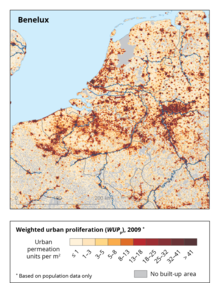Our website is made possible by displaying online advertisements to our visitors.
Please consider supporting us by disabling your ad blocker.
Flemish Diamond
Flemish Diamond
Vlaamse Ruit | |
|---|---|
 Brussels, capital and largest city of Belgium | |
 | |
| Country | |
| Regions |
|
| Largest cities | |



The Flemish Diamond (Dutch: Vlaamse Ruit) is the Flemish reference to a network of four metropolitan areas in Belgium, three of which are in the central provinces of Flanders, together with the Brussels-Capital Region.[1] It consists of four agglomerations which form the four corners of an abstract diamond shape: Brussels, Ghent, Antwerp and Leuven.[2]
In 2007, approximately 5 million people lived in this area, with a population density of about 820 per square kilometer[3] which accounted for roughly 47% of the total population of the country (c. 10.5 million).
- ^ Note: The Flemish government has no authority on economical matters in the Brussels Capital Region, which with nearby Flemish municipalities (with industrial areas in the directions of the Brussels airport, which is located in Flanders, and of or at the small cities of Vilvoorde and Asse) (de Vries, 2002, p. 139), forms one of the major economic metropolitan areas of the 'Flemish' Diamond'.
- About constitutionally defined competences, see Communities, regions and language areas of Belgium.
Association of a fraction of the Walloon Region with the Brussels metropolitan area, by some sources, was contested by others. See e.g.:
- Vandenbussche, Barbara. "Waals-Vlaamse transfers in kaart gebracht ('Wallonian-Flemish transferts mapped')" (in Dutch). DeWereldMorgen.be (news site), Brussels region, Belgium. Archived from the original on 2 February 2014. Retrieved 4 March 2011.
- Cantillon, Bea; De Blust, Seppe; Van den Heede, Aaron (July 2010). "2.1. Vlaams en Randstedelijk, de draagkracht van de sociale zekerheid". De geografie van de sociale zekerheid in België (in Dutch). University of Antwerp. p. 2. Retrieved 4 March 2011.
De Vlaamse ruit wordt in dit bericht gedefinieerd vanuit een economisch-geografische realiteit. De Vlaamse ruit wordt gevormd door het gebied tussen de steden Brussel, Antwerpen, Gent en Leuven en hun forensen. Waals Brabant hoort zo grotendeels bij de Vlaamse ruit. ('The Flemish Diamond is in this message defined from an economical-geographical reality. The Flemish Diamond is formed by the area between the cities of Brussels, Antwerp, Ghent, Leuven and their commuter suburbs. As such, Walloon Brabant for a large part belongs to the Flemish Diamond.')
- Mouton, Alain, ed. (20 August 2010). "Kritiek op CSB-studie over Vlaams-Waalse transfers". Trends Weekly (in Dutch). Archived from the original on 27 October 2010. Retrieved 4 March 2011.
Herman Deweerdt (AK-VSZ Archived 27 November 2020 at the Wayback Machine): Het is zeker waar dat de Vlaamse ruit een centrum van economische activiteit is en dus een zeer belangrijke basis vormt voor de financiering van de sociale zekerheid, [m]aar voor de gelegenheid Brussel weglaten en er Waals-Brabant bijvoegen om dan te beweren dat het centrum van het land de rest financiert, is niet correct. ('Surely the Flemish Diamond is a centre of economic activity and thus forms a base for social security financing, but for that occasion omitting Brussels and adding Walloon Brabant, for then posing that the country's centre is financing the remainder, is not correct.')
- ^
Wintjes, René; Cobbenhagen, Jan (December 1999). "Flanders Language Valley; Industrial Districts and Localized Technological Change" (PDF). MERIT, University of Maastricht, the Netherlands: 5. Retrieved 2 March 2011.
the economic and scientific core of Flanders: 'Vlaamse Ruit' (Gent, Antwerpen, Brussel, Leuven)
{{cite journal}}: Cite journal requires|journal=(help) - ^ Meijers, Evert J. (2007). Synergy in Polycentric Urban Regions: Complementarity, Organising Capacity and Critical Mass. IOS Press. p. 54. ISBN 9781586037246.
Previous Page Next Page


